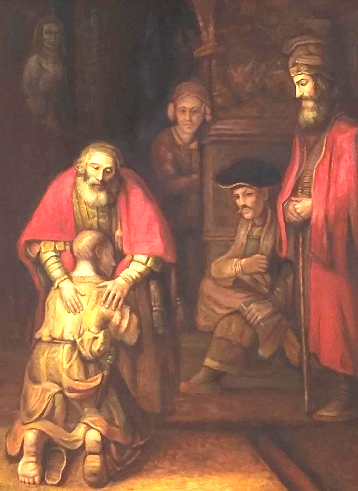The lost son: This has been called ”the greatest short story in the world.” It speaks about the deep effects of sin, the self-destruction of hatred and the infinite mercy of God. This is a story of love, of conflict, of deep heartbreak, and of ecstatic joy. The scene opens on a well-to-do Jewish family. With the immaturity of a spoiled brat the younger son demands impudently of his gracious father, “Give me the portion of goods that falls to me.” Demanding inheritance while the father was alive was equivalent to treating the father as dead. Under Jewish law, when a father divided his property between two sons, the elder son had to receive two-thirds and the younger one-third (Dt 21:17).
In Jesus’ parable, the younger son offends his father again by selling out his share of the inheritance and then squandering the money in a faraway city. The land was sacred to the Jewish people because it was the Promised Land given to the Chosen People. Hence, each bit of land was considered holy, and no Israelite could lawfully sell his property (Lev. 25:23, I Kg. 21). Ancient “social security” basically consisted in sons farming their father’s land and taking care of their parents until their death. Thus, in selling his land, the prodigal has sold his parents’ social security.
The conversion, return, and confession: When he becomes bankrupt, the prodigal son ends up feeding pigs, a task that was forbidden to a Jew (Leviticus 11:7; 14:8). Having sunk to the depths of economic, spiritual and moral depravity, the prodigal finally “comes to his senses” (v. 17). So he decides to return to his father, to ask his forgiveness and to beg for the status of a hired servant.
When he sees his son returning, the ever-watchful father runs to him and gives him a cordial welcome along with a new robe, a ring and new shoes. Symbolically, the robe stands for honor; the ring for authority (the signet ring gave a person the power of attorney) and the shoes for the son’s place as a member of the family (slaves did not wear shoes). The father also throws a great feast killing the “fatted calf’ reserved for the Passover feast so that all may rejoice at the wanderer’s return.
The “Prodigal Father” and the self-righteous elder brother: The parable illustrates the wonder of God’s love and unconditional forgiveness. God seeks out the sinner and forgives him unconditionally. Jesus recounts the story of the elder brother as his response to the accusation by the self-righteous Pharisees that he was the friend of sinners. The elder brother represents the self-righteous Pharisees who would rather see a sinner destroyed than saved. He reflects the Pharisees’ attitude that obedience to Mosaic Law is a duty, not a loving service. Like the Pharisees, the elder brother lacks sympathy for his sibling and levels accusations against him. As a self-righteous person, he refuses to forgive. Thus, his grudge becomes a sin in itself, resulting in his self-exclusion from the banquet of his father’s love. That is what we all do when we sin. We exclude ourselves from the banquet of God’s love.
– Source: Father Tony Kadavil
Love and Peace
Fr. Bernardino Andrade
